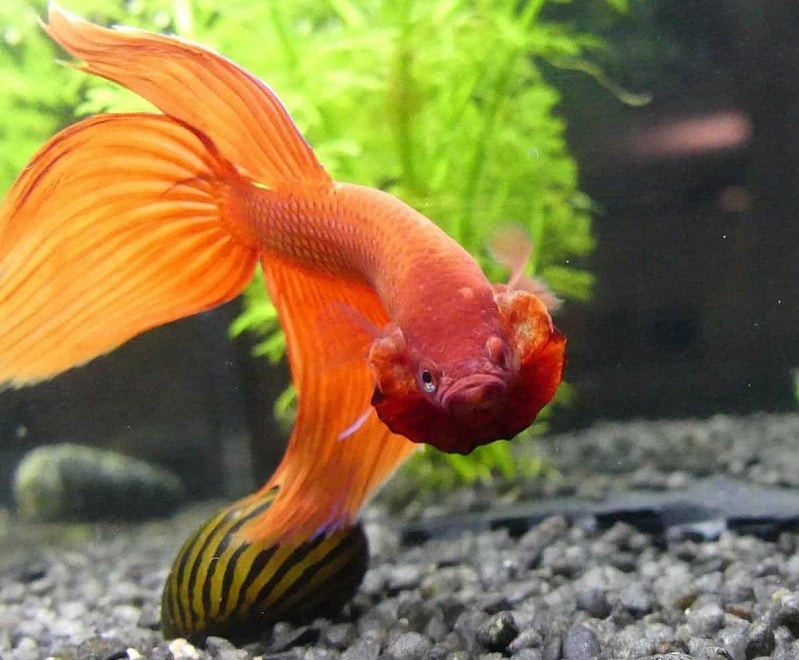Are your Betta fish constantly at odds, leaving you puzzled and concerned about their well-being? Have you ever wondered why betta fish fight or what might make a betta fish mad, and what drives this intriguing yet sometimes challenging behavior?
Learn about the underlying reasons behind why betta fish are so aggressive, understand the dynamics between male and female Bettas, and learn effective strategies to prevent or manage betta fish fighting to the death among your aquatic companions.
Are Betta Fish Aggressive?
For those embracing the calming presence of aquariums in their spaces, understanding the nature of Betta fish is crucial.
While admired for their vibrant colors, male Bettas are known for their combative tendencies, sometimes betta fighting fiercely. Though females are generally more sociable, they can show signs of aggression too, leading many to question, do female betta fish fight?
In community betta fish tanks, it’s wise to pair Bettas with more subdued fish, as they may confront those with bright or showy appearances. Their aggressive behaviors can stem from internal concerns like hunger or stress, as well as external factors such as dominance disputes or mating rituals.
By understanding these triggers, we can create a more harmonious environment for these stunning creatures, enriching our own spaces and mental well-being.

What Is Fighting in Betta Fish?
For those passionate about aquariums, understanding the intricate behaviors of Betta fish can be both intriguing and essential. A common display of aggression in Bettas is “flaring”.
Here, a male Betta will protrude its operculum’s (or gill covers) forward, mimicking a larger body – much like how a puffer fish expands and shows its spines when threatened.
Yet, flaring isn’t the sole sign of disagreement. Physical confrontations between Bettas can manifest as how do betta fish fight, such as one fish ramming into another, biting or nipping at fins, or even engaging in a peculiar behavior where two betta fish fighting involves locking lips and appearing to wrestle.
Observing and understanding these behaviors ensures a safer and more harmonious environment for these captivating creatures.

Why Do Betta Fish Fight?
Betta fish are known to spar in order to stake their claim over territory, food, shelter, and mates – a behavior seen across many fish species.
Is this aggressive betta fish behavior inborn, or does it arise from their upbringing? Some research suggests that bettas raised collectively exhibit less aggression.
Yet, deciphering a betta’s history from certain suppliers can be tricky. It may even take a few weeks post-purchase to gauge their aggression levels. It’s widely accepted that most male bettas are inherently more aggressive and shouldn’t cohabitate with their kind.
Historically, in Thailand, bettas were bred as competitive fighters. Studies note that isolated bettas, devoid of their species’ companionship, are more aggressive and combat for extended durations. Such practices, akin to dog fighting, pose grave ethical concerns regarding animal welfare.
Female bettas, on the other hand, typically show reduced aggression. They often coexist in groups called “sororities” or “harems,” where hierarchical dynamics play out.
When new females are introduced, temporary aggression might arise as the pecking order reshuffles. Despite this, female bettas generally harmonize well with other similarly sized fish species in a community tank.
For those considering a multi-species tank, male bettas can share space with other non-aggressive species, but caution is advised.
Bettas might confront fish with fin features resembling their own. The key lies in choosing non-confrontational, community-minded fish.
However, each betta has its temperament; while some integrate smoothly, others may be too aggressive for a shared environment. To minimize conflict, consider introducing the betta to the aquarium last.
Source: Aqua Diary
Signs of Fighting in Betta Fish
Common indicators of aggressive behavior in betta fish, sometimes leading to fatalities, include gill flaring and actions like ramming or fin nipping. Even if you don’t witness an actual skirmish, physical evidence such as lost scales, torn fins, or hiding.
More concerning symptoms like lethargy, reduced appetite, extended hiding phases, or unexplained deaths suggest heightened stress or potentially harmful conditions.
When housing female bettas together, any indication of aggression mandates immediate separation of the aggressive individual.
Another prevalent concern in bettas is “fin rot,” identifiable by deteriorating or fraying fins. Due to their long, graceful fins, bettas are particularly susceptible. This ailment often signifies broader health issues, possibly an impaired immune system.
Over-decorating the tank with sharp or abrasive objects can also contribute to fin damage. When setting up your aquarium, choose decorations thoughtfully, ensuring they’re betta-friendly and won’t cause harm.

How to Stop Betta Fish From Fighting?
To ensure tranquility in your aquarium, it’s advisable to house only one male betta per tank. If you maintain multiple betta tanks, place a visual barrier between them to prevent the fish from spotting each other.
Simple solutions like aquarium backgrounds or even a piece of cardboard can serve effectively as barriers.
Be wary of objects with reflective surfaces, such as toys with mirrors or external mirrors placed nearby.
Bettas often mistake their reflection for a rival, prompting betta fight reactions. While some might argue that such items enrich the environment, they’re known to stress bettas.
Interestingly, in research settings, substances like marijuana and Prozac have been explored to temper betta aggression. Both treatments reduced aggressive tendencies, though bettas did develop a tolerance to the marijuana dose over time.
However, it’s paramount to speak with a veterinarian before considering any treatments for your aquatic pets. Always prioritize their natural well-being and comfort.

Conclusion
In conclusion, Betta fish fight for various reasons, such as defending their territory, breeding behaviors, stress, overcrowding, and lack of food.
To reduce aggression in betta fish, it is essential to provide enough space and hiding places in the tank. As a rule of thumb, avoid placing a male betta fish with another male. Creating a peaceful environment for your betta fish involves understanding triggers that cause aggression, providing ample space and hiding spots, separating male and female after breeding, and maintaining good water quality.
Explore further
- How to make a betta fish happy “6 enrichment ideas”
- What happens if you put a male and female betta fish live together?




